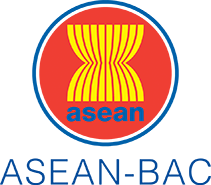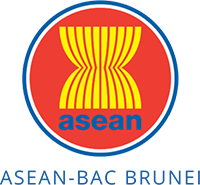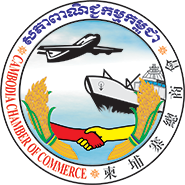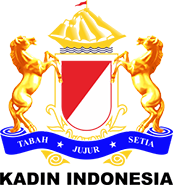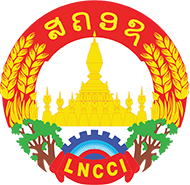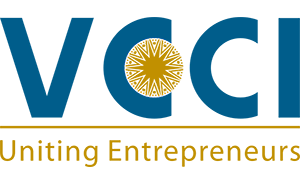summary
February 9th 2021
4th Webinar: Upgrading Food Value Chain in Mekong and ASEAN
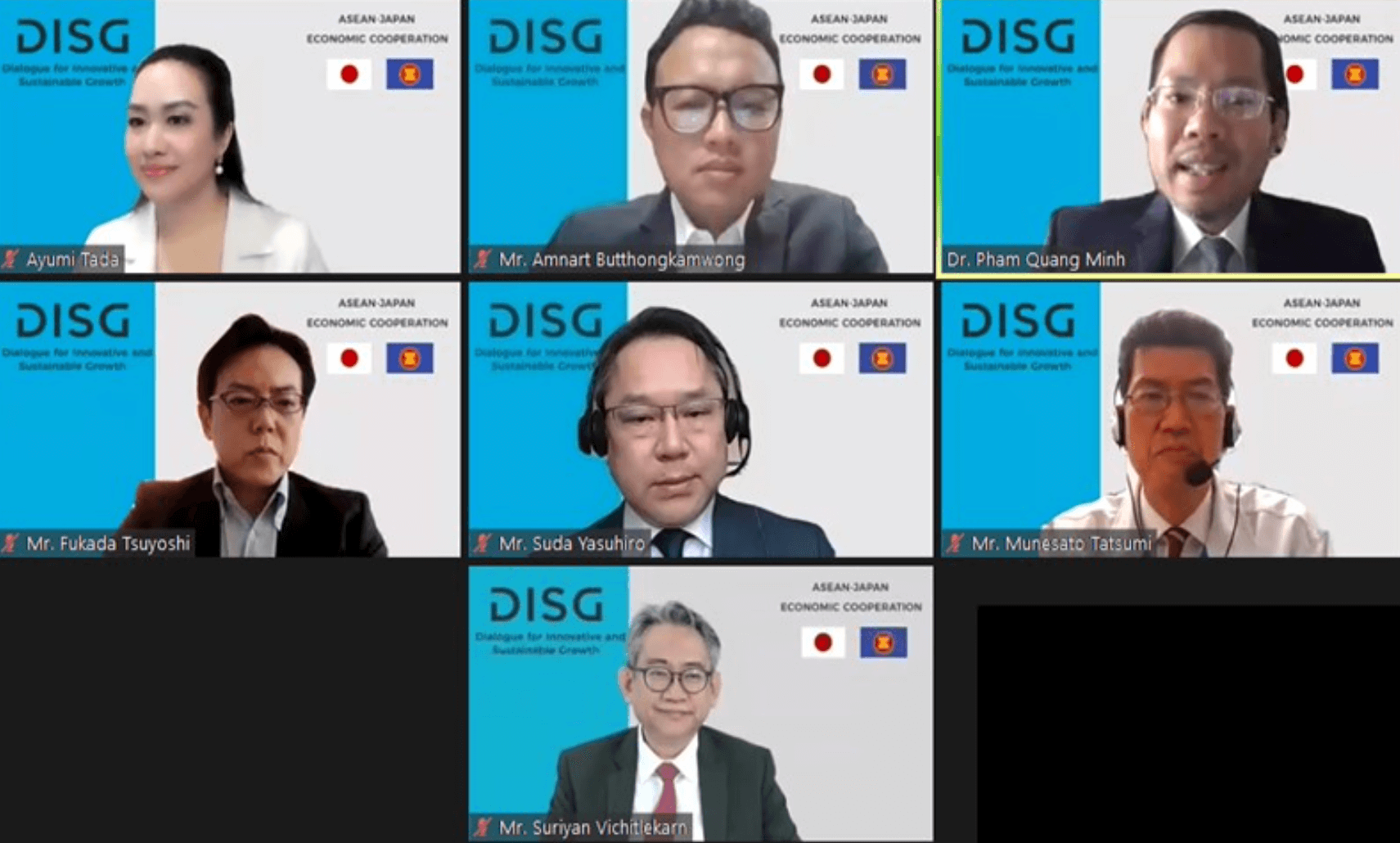
Agenda
1. Opening remarks from the Vietnam Chamber of Commerce and Industry (VCCI)
2. Keynote speech from Mekong Institute
3. Panel discussion between Mekong Institute, the ASEAN Secretariat, Sojitz, JTEC, Siam Kubota, and Yamato Green
Speaker
-
Dr. Doan Duy Khuong
Vice President, the Vietnam Chamber of Commerce and Industry (VCCI) and Co-Chair, ASEAN Business Advisory Council (ASEAN-BAC) -
Mr. Suriyan Vichitlekarn
Executive Director, Mekong Institute -
Dr. Pham Quang Minh
Head of Food, Agriculture, and Forestry, the ASEAN Secretariat (ASEC) -
Mr. Suda Yasuhiro
Deputy Manager, Vietnam Business Development Office, Food & Agriculture Business Division, Sojitz Corporation -
Mr. Munesato Tatsumi
Director, Japan Telecommunications Engineering and Consulting Services (JTEC) -
Mr. Amnart Butthongkamwong
Kubota Solutions Department Manager, Siam Kubota Corporation Co., Ltd. -
Mr. Fukada Tsuyoshi
Executive Adviser, Yamato Green Co., Ltd.
Moderator
-
Ms. Ayumi Kalthida Tada
Director of Public Relations, AMEICC Secretariat
Webinar Summary
This webinar was held as the 4th series of Webinar, a part of the “Dialogue for Innovative and Sustainable Growth (DISG)”. The summary of this webinar entitled “Upgrading Food Value Chain in Mekong and ASEAN” is as follows.
(Opening Remarks)
Dr. Doan Duy Khuong emphasized COVID-19 can serve as a trigger to promote digitalization and an opportunity for the business corporations in various regional projects especially with Japanese counterparts which are well known for their advanced technologies. ASEAN-BAC and VCCI are ready to cooperate with all stakeholders to improve the food value chain in the region through 2020 ASEAN BAC Legacy Project, Digital STARS, the cooperation in Mekong River exploration and Eastern Sea security, as well as the cooperation in responding to COVID-19 to recover the economy in the post-pandemic.
(Keynote Speech)
Mr. Suriyan Vichitlekarn shared the current issues and challenges in ASEAN and Mekong agriculture. Highlighting a paradigm shift to a more efficient food production system and value chain, the limited natural resource and climate changes and uncertain natural disasters, he said that farmers in the region have to address these challenges and also meet several demands: high productivity with social and environmental responsibility, the food safety with high quality, reduction of food loss and waste and ensuring access to credit and finance. In addition to the major development directions and solutions in national and ASEAN policy frameworks and initiatives, he also introduced good collaborative actions among ASEAN/Mekong countries and Dialogue Partners for upgrading food value chain.
(Panel Discussion)
Dr. Pham Quang Minh highlighted key priority areas of “the Vision and Strategic Plan for ASEAN Cooperation in Food, Agriculture and Forestry (2016-2025)”, which include: improvement of quality and quantity of agricultural products by using green technology, enhancement of market access, food security and safety, and assistance for MSMEs. He then pointed out the current challenges such as demand for food traceability, food safety and quality, supply chain costs and so on. He suggested solutions where digital technologies would help, and introduced the ongoing ASEAN-Japan cooperation projects which contribute to upgrading food value chain in ASEAN.
After that, panelists from four Japanese companies, Mr. Suda from Sojitz, Mr. Munesato from JTEC, Mr. Amnart from Siam Kubota, and Mr. Fukada from Yamato Green respectively introduced their activities which address the above-mentioned challenges, followed by a discussion on each company’s solution. Sojitz created a data platform, named PigNet, which provides vital information to MSMEs pig farmers in Vietnam using IT management systems. Mr. Suda explained that the platform will enable MSMEs to increase the sales and income as well as to resolve the information gap.
JTEC helps farmers in Myanmar to increase the quality and quantity of crops by providing remote cultivation guidance, cultivation history management and cultivation plan suggestions for contract cultivation. SIAM KUBOTA has established “KUBOTA FARM” and “SIAM KUBOTA Community Enterprise” to promote sustainable smart farming. They provide agricultural knowledge and machinery solutions and help farmers save costs and increase yield as well as encourage them to sell their own crops at online marketplace.
Yamato Green has been setting up the “All Japan” integrated food value chain in Cambodia, consisting of a consortium of 18 Japanese companies and ensuring the quality of the products in terms of safety and security. Dr. Minh welcomed that these activities are well aligned with ASEAN’s directions and provided the expectation for Japanese companies to continue to work with and support the ASEAN region to improve their capability on the food value chain and food security. He also highlighted the priority areas expected for Japanese companies: development of agriculture standards and practices, implementation of the traceability system and application of technologies. Mr. Suriyan emphasized, as the expectation for Japan, the importance of supporting to enable national policies, creating a platform where Japanese companies can work together with local companies and governments, and supporting scaling up and adoption of digital technologies.
Lastly, four panelists from Japanese companies confirmed continuous contribution on upgrading food value chain in ASEAN and Mekong region through innovative technologies, collaboration with local NPOs and NGOs, providing access to low interest finance scheme, and localization of Japanese technologies and experiences.
Opening Remarks
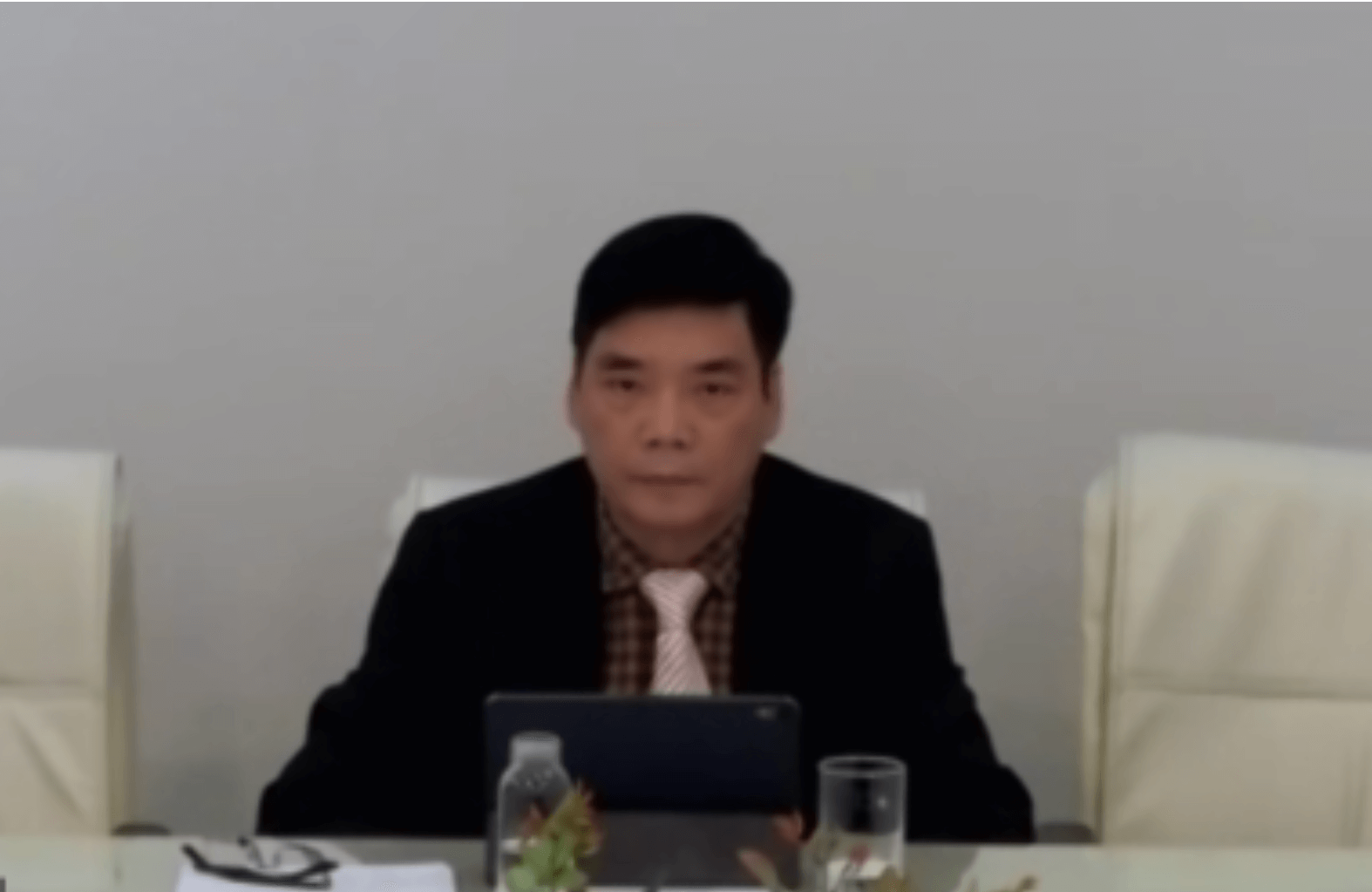
Dr. Doan Duy Khuong, Vice President, the Vietnam Chamber of Commerce and Industry (VCCI) and Co-Chair of ASEAN Business Advisory Council (ASEAN-BAC), provided the expectation for ASEAN-Japan cooperation in agriculture and food value chain area.
Despite Covid-19 creates a lot of uncertainties and hinders business progress, COVID-19 also serves as a trigger to promote digitalization within the businesses across the region, and provided opportunity for the business corporations in various regional projects especially with Japanese counterparts who are well known for advanced technologies and innovation.
From the perspective of ASEAN Business Advisory Council (ASEAN-BAC) and Vietnam Chamber of Commerce and Industry (VCCI), the ASEAN-Japan cooperation can grow to be closer and deeper in the near future, and ASEAN-BAC and VCCI are ready to cooperate with all stakeholders in the three main areas to improve our food value chain in the region. The first area is the 2020 ASEAN BAC Legacy Project, Digital STARS, where entrepreneurs and technologies enables business environment by creating a network of ASEAN Tech Start-up and facilitating the MSMEs digital transformation in the region in the fourth industrial revolution. Any ideas of cooperation from interested parties in ASEAN and Japan are welcome with this Legacy project, which will be continued in the years to come with the approval of ASEAN leaders. The second area is the cooperation in Mekong River exploration and Eastern Sea security since these areas are playing an important role in the food value chain of the whole region. The third area is the cooperation in responding to the COVID-19 pandemic to recover and develop the economies in the post pandemic.
I congratulate the DISG organizers on their 2020 achievement and looking forward to cooperating more in this initiative to bring a brighter future to the people, and wishes great success to the webinar and its contribution to the economic cooperation between ASEAN and Japan.
Keynote Speech
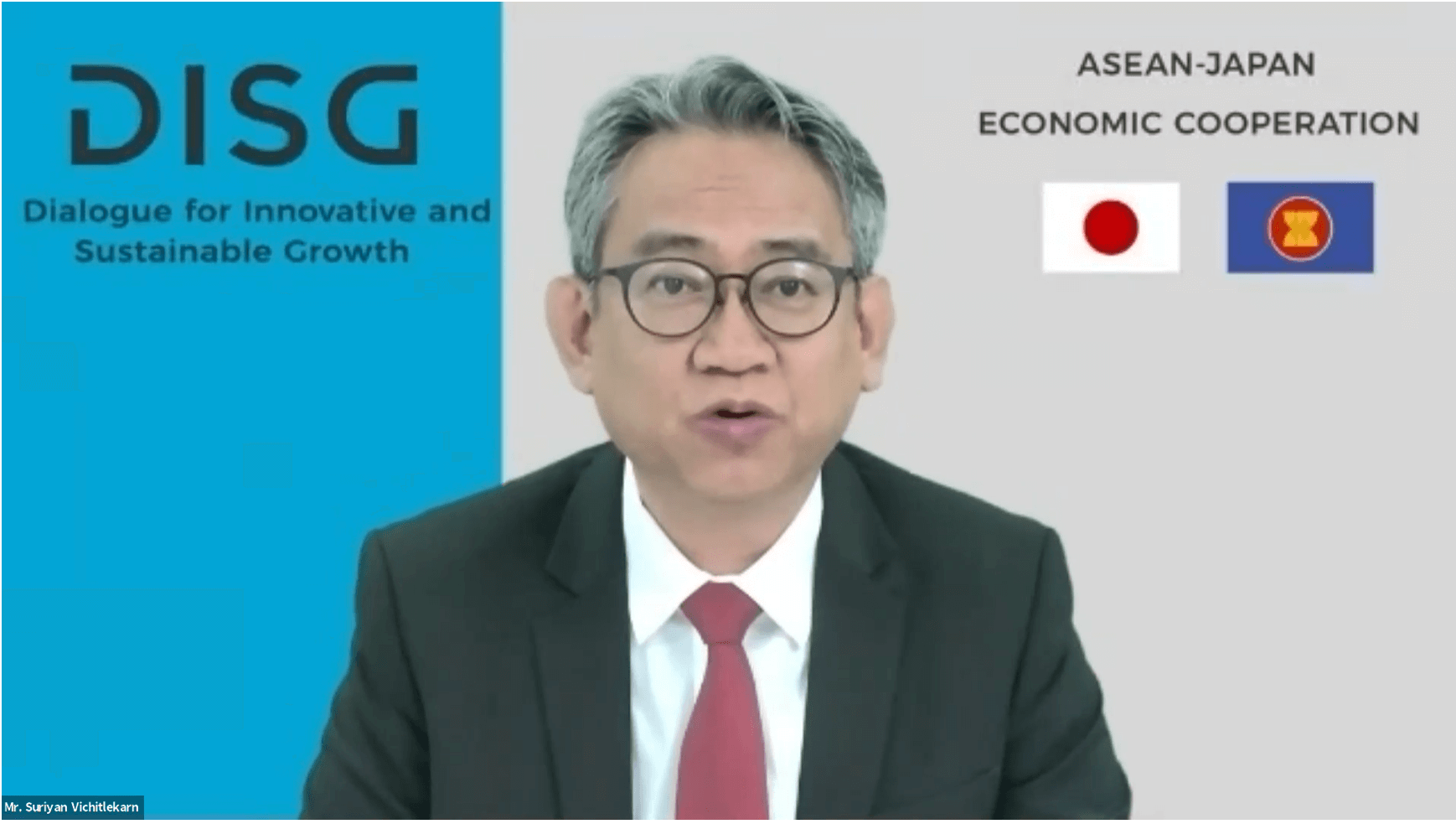
Mr. Suriyan Vichitlekarn, Executive Director, Mekong Institute, shared the issues, challenges as well as major development directions and solutions in the field of agriculture and food value chain in Mekong region, and introduced Greater Mekong Sub-region and ASEAN’s agenda for actions.
Issues and Challenges in Food & Agriculture in Mekong region
The region is experiencing high growth of population and change of consumption patterns and preferences. This resulted in a paradigm shift to a more efficient food production system and value chain. And, considering the limited arable land and water, this would require changes and innovation in agriculture practices. Also, the sector has to adapt the extreme climate events as well as uncertain natural disasters and mitigate its impacts. In addition, the sector needs to explore practices that result in higher productivity with social and environmental responsibility. Besides, ensuring the food safety with high quality will be important for access to quality markets and reducing post-harvesting losses and food loss and waste are also important. Last but not least, in order to upgrade technologies and practices, farmers and MSMEs need to be able to access credit and agricultural finance.
Major Development Directions & Solutions
The following six items are major development directions and solutions in ASEAN policy framework and initiatives: 1) promoting the adoption of good agricultural or sustainable practices as well as standards, 2) empowering farmers through group organizations and MSMEs development, 3) introduction of digital technologies and mechanization with fostering technical and financial capabilities, 4) engaging farmers into “inclusive and sustainable” agriculture value chains, 5) enhancement of agricultural infrastructure and logistics such as innovative packaging and cold chain, 6) development and implementation of climate and disaster risk reduction measures such as insurance and compensation schemes
GMS and ASEAN’s Agenda for Actions
ASEAN and Mekong countries as well as Dialogue Partners have promoted collaboration to support development of food and agriculture sectors, particularly for upgrading food value chain through: 1) operationalizing existing regional policies, guidelines and initiatives by supporting capacity building and providing dialogue and platforms for public private partnerships, 2) working in supporting cross-border value chain and trade by minimizing barriers and enhancing effectiveness, 3) integrating food and agriculture in regional economic corridors as implementing the development solutions will showcase benefits as well as facilitate successes in the long-run.
Panel Discussion
ASEAN Secretariat’s view on overall ASEAN agriculture and food value chain
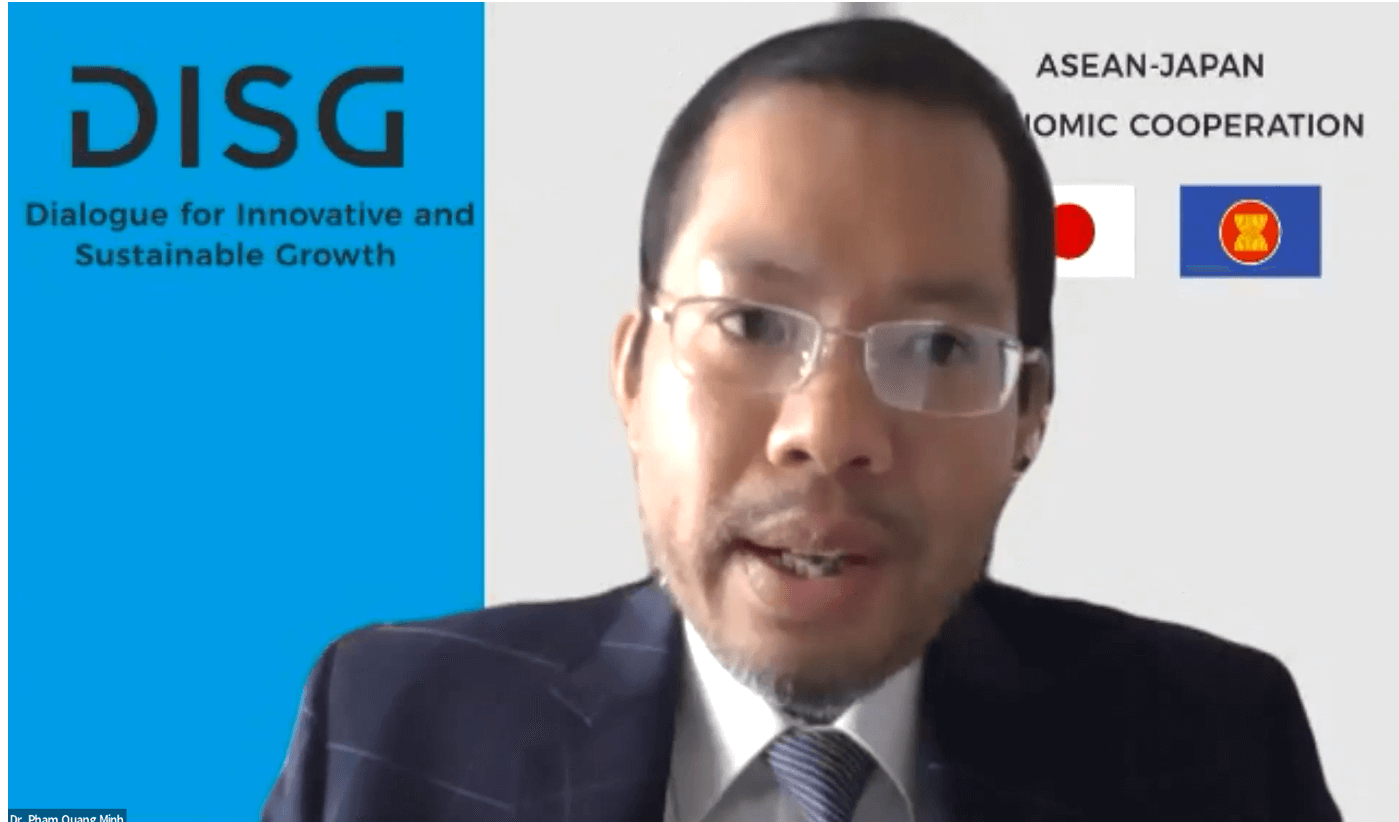
Dr. Pham Quang Minh, Head of Food, Agriculture, and Forestry, the ASEAN Secretariat, presented the ASEAN agricultural situation, and future plans and solutions.
Vision and Strategic Plan for ASEAN Cooperation in Food, Agriculture and Forestry
The ASEAN cooperation in the agriculture and food sector has started since 1968, with a focus on food production and supply area. To date, the areas of cooperation have been expanded into various aspects, such as: food security and food safety, research and development, and training and extension. The agricultural sector is very important as it accounts for over 25% of GDP in some ASEAN Member States.
The ASEAN Member States have identified key priority areas of cooperation, among others: 1) to improve the quality and quantity of the agricultural products by using green technologies, 2) to enhance trade facilitation, economic integration and market access, 3) to ensure food security and food safety and nutrition, and 4) to assist small producers and MSMEs to improve productivity, technology and product quality.
Food value chain challenges
The challenges of food value chain in ASEAN are: 1) increasing demand for food traceability due to consumers concerns regarding food origin and safety, 2) ability to maintain the safety and quality of food products, 3) rising supply chain costs such as energy, manpower, logistics, and investment in new technology, 4) poor communication between food supply chain partners, and 5) growing stricter regulations on food supply chain. Dr. Minh suggested some solutions to tackle each issue, and pointed out that the application of technology will make it easier, faster and more affordable for the overall food supply chain.
Symbolic activities and projects to upgrade food value chain in ASEAN
In addition to some symbolic activities in the ASEAN region, such as: 1) development and alignment of agricultural standards, 2) development of ASEAN Food Safety Policies (AFSP) and ASEAN Food Safety Regulatory Framework (AFSRF), and 3) development of regional guidelines for traceability for food and feed, several ASEAN-Japan cooperation projects were also introduced, namely: a) ASEAN-JICA Food Value Chain Development Project, b) Project for Enhancing the Recognition of GAP (Good Agriculture Practices) by Partnership with ASEAN, which is fully supported by the Ministry of Agriculture, Forestry and Fishery (MAFF), Japan, and c) Capacity Building Project for Farmer’s Organization to Support Food Value Chain in ASEAN Countries, which is also supported by MAFF.
Sojitz (Vietnam)’s Activity and Discussion
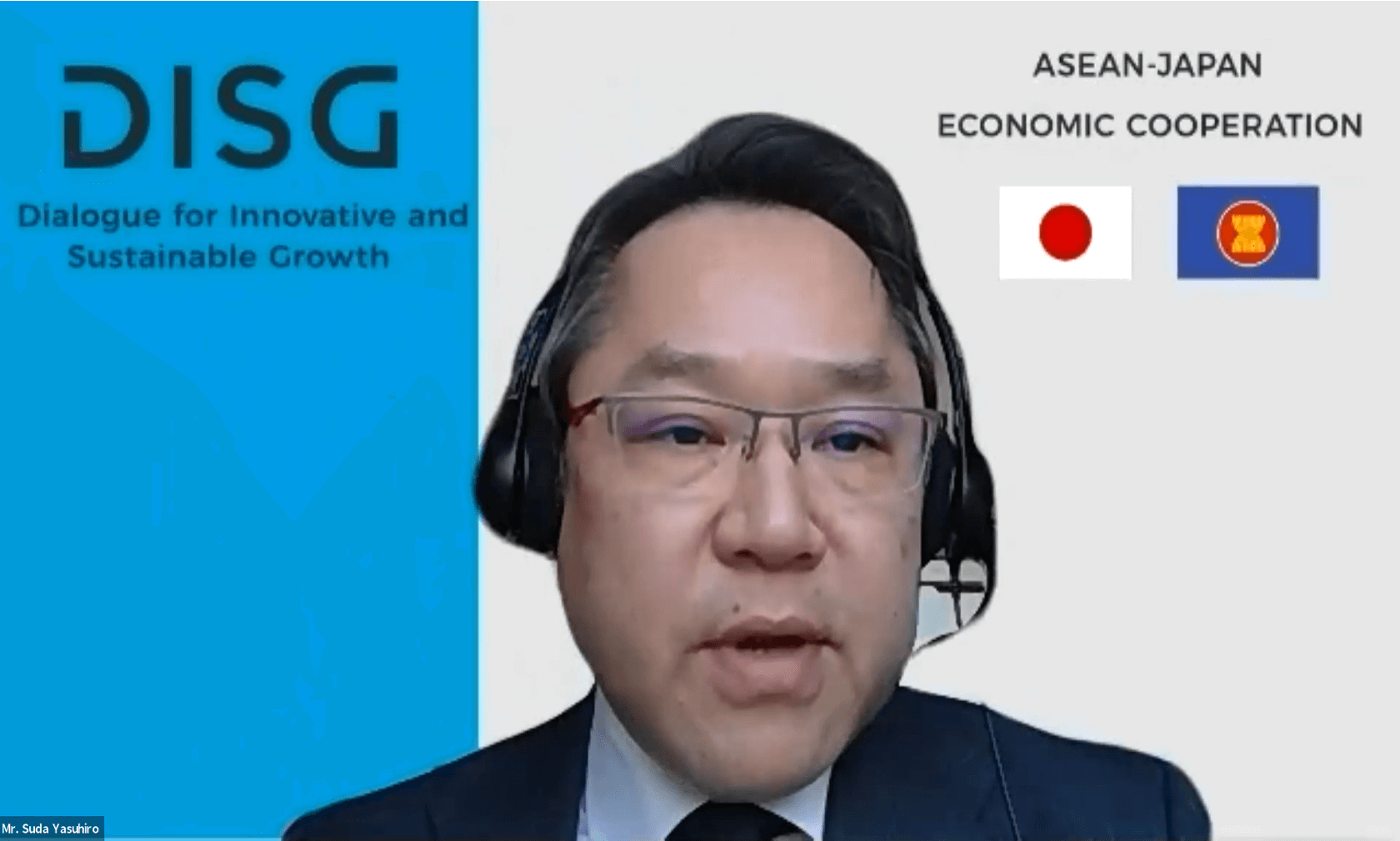
Mr. Suda Yasuhiro, Deputy Manager, Vietnam Business Development Office, Food & Agriculture Business Division, Sojitz Corporation, presented the PigNet platform and contribution towards Vietnam MSMEs.
Overview of Sojitz’s “PigNet” in Vietnam
-
Mr. Suda:
The Pignet is a platform business for pig farmers to increase their income and productivity. Problems are visualized and farmers can understand what measures should be taken immediately. Through the PigNet platform, Sojitz also provides insurance, IoT devices and E-commerce opportunities by utilizing breeding data to anticipate future income and potential opportunities for the farmers.
Sojitz solution’s contribution to MSMEs
-
Mr. Suda:
The first target is to increase sales and income of MSMEs. The PigNet allows mother pigs to deliver more piglets more frequently so that farmers can increase productivity. Besides, the PigNet will help farmers overcome their disadvantages such as information gaps since this platform provide information regarding finance and consulting to MSMEs.
Investment and collaboration with Vietnam start-up
-
Mr. Suda:
Sojitz invested in and chosen RYNAN, a Vietnamese start-up as a partner because they can provide highly efficient integrated solution service. RYNAN’s DX technology is indispensable for Sojitz's plan in Vietnam and Mr. Suda would like to widely introduce them in Southeast Asia.
Expectation from ASEAN to Sojitz and Japanese companies
-
Dr. Minh:
In 2020, the ASEAN Ministers of Agriculture and Forestry adopted the ASEAN Strategic Plan of Action for Cooperation on Livestock, 2021- 2025. Sojitz's activities are likely aligned with this Strategic Plan of Action. In this connection, Japanese companies could focus on quarantine inspection and standard procedure for livestock trade, disease control and food safety. The ASEAN Secretariat is pleased to work with Japanese companies to enhance the livestock cooperation in the ASEAN region through the effective implementation of the Strategic Plan of Action.
JTEC (Myanmar)’s Activity and Discussion
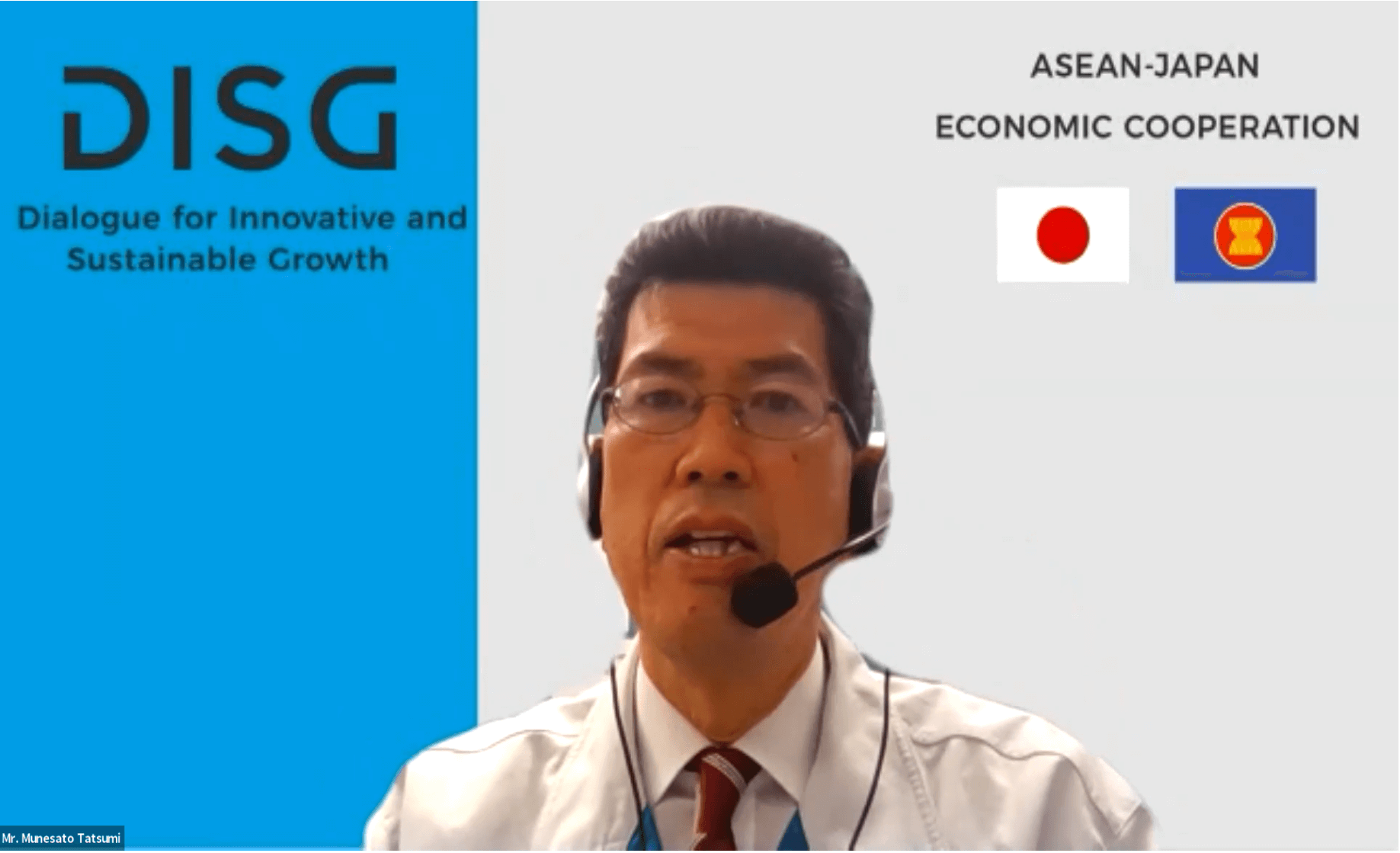
Mr. Munesato Tatsumi, Director, Japan Telecommunications Engineering and Consulting Service (JTEC), presented how JTEC is improving the livelihood of Myanmar’s farming communities.
Overview of JTEC activity in Myanmar
-
Mr. Munesato:
JTEC realized lack of information on agriculture in Myanmar villages through conduction of e-village project and researches, and then JTEC has set up websites and provided educational tools and materials.
JTEC has proposed for farmers in Myanmar to focus more on the quality of the product instead of the traditional method of selling by weight by digitalization and technologies. JTEC provided the communities with digital manuals including training videos
Other key activities are to provide the communities with remote cultivation guidance from Japanese experts and to support contract cultivation by digital technologies. By using cultivation history management and cultivation plan suggestions, farmers can increase the quality and quantity of crops to meet the demand of processing companies and in turn improve their level of income.
Farmers’ income improvement by digital
-
Mr. Munesato:
Japanese companies have a demand for stable quality and quantity. If farmers can meet these demands by digital, the crops can be bought at a higher price compared to traditional markets.
JTEC way to stabilize the quantity and price for contract cultivation
-
Mr. Munesato:
Cultivation history management will allow the purchaser to see the history of date and time that pesticide or fertilizer was applied to a crop. Digital manuals and remote guidance will be able to provide know-how on agriculture methods, thus the quality can be guaranteed.
Expectation from ASEAN to JTEC and Japanese companies
-
Dr. Minh:
JTEC’s activities enable farmers to access information on agriculture and market, and to facilitate digitalization. Dr. Minh also expects that Japanese companies would continue to work with and support the ASEAN region to improve its capability on both the food value chain and food security.
Siam Kubota (Thailand)’s Activity and Discussion
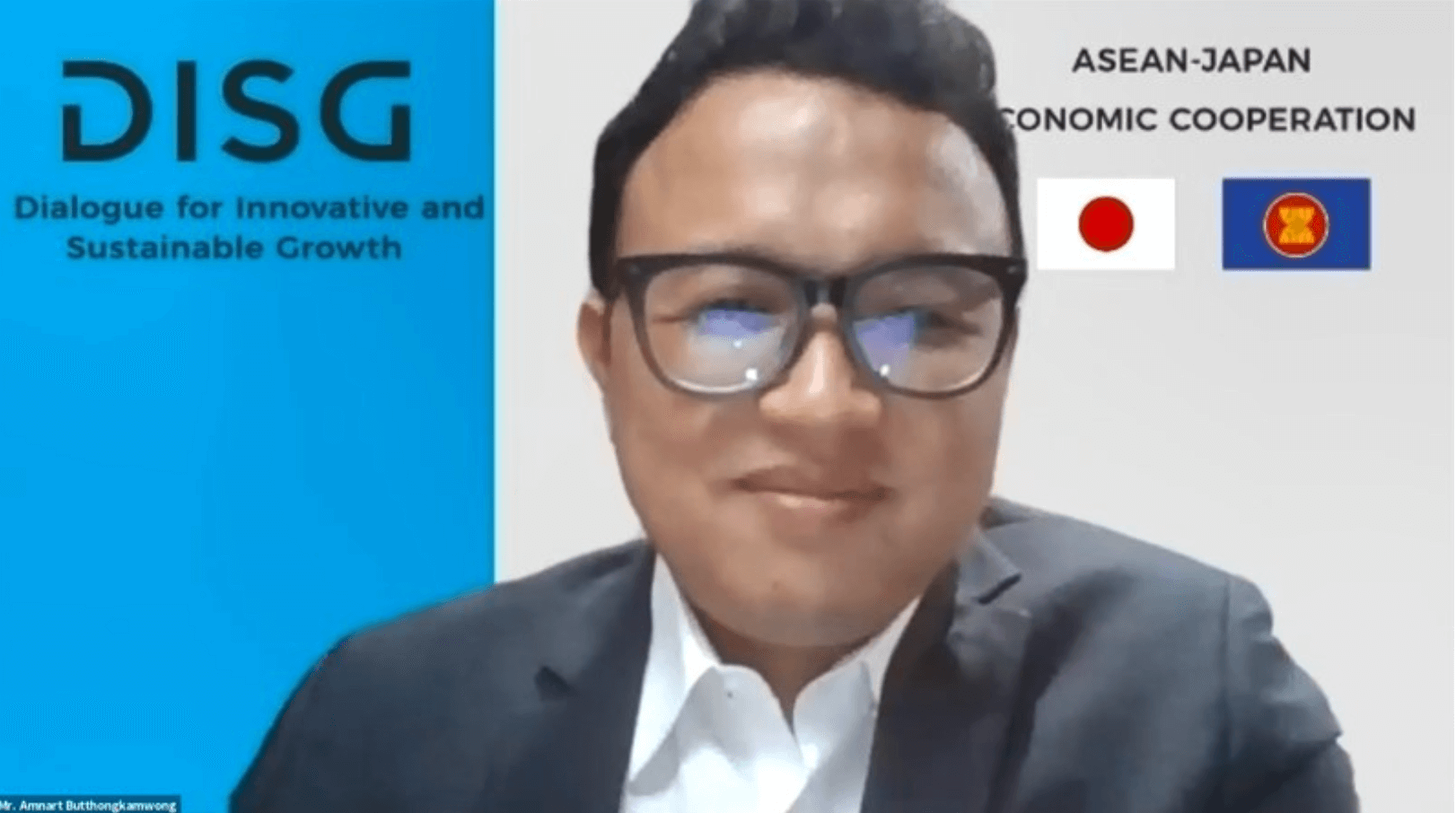
Mr. Amnart Butthongkamwong, Kubota solutions department manager, Siam Kubota Corporation Co., Ltd., presented an overview of how smart farming can be successfully implemented.
Overview of “KUBOTA FARM” in Thailand
-
Mr. Amnart:
Most ASEAN farms are small and managed by aging farmers using traditional methods, and they lack accessibility of machinery usage and agricultural knowledge on how to optimize small farm to get high revenue.
SIAM KUBOTA has established “KUBOTA FARM” as smart farming experience farm with a concept of End-to-End Solutions to enhance value added chain from up-stream process to down-stream process. KUBOTA FARM is a showcase of best farming practice with both high technologies-enabled solutions and basic technology solutions. Once the farmers realize how the economy of scales of larger farms can increase their profits, they will be willing to work together, share and pool their resources to enable smart farming methods in their farms.
Extension of smart farming concept to farmers sustainability and Key Success Factors
-
Mr. Amnart:
SIAM KUBOTA’s smart farming concept covers every aspect of farming. In the up-stream processes, SIAM KUBOTA provides agricultural knowledge and machinery solutions and helps them save costs and increase yield. In the mid-stream, SIAM KUBOTA helps farmers add their product value. In the down-stream, SIAM KUBOTA helps farmers sell directly to end consumers at the online platform.
SIAM KUBOTA created a community of farmers called “SIAM KUBOTA Community Enterprise (SKCE)” that will help transition from traditional methods to smart farming and also partner with the Thailand government to provide soft loan with low-interest rates to farmers.
Key success factors for establishing smart farming community are: 1) for farmer groups, government and Siam Kubota to be aligned with same goal, 2) to provide End-to-End Solutions and technologies, 3) to educate and bring farmers to marketplace where high value-added products can be sold at fair price, 4) to get government support.
Next move of smart farming community in Mekong and ASEAN
-
Mr. Amnart:
SIAM KUBOTA will provide smart farm digital platforms, smart farming machinery and smart greenhouse to help facilitate crop cultivation and reduce uncertainty, labor costs and control crop quality. SIAM KUBOTA believes collaboration among government, farmers and private sectors will make a great unity to develop smart farming to enhance ASEAN agriculture sustainability.
Expectation from ASEAN to Siam Kubota and Japanese companies
-
Dr. Minh:
It is expected that Siam Kubota would further help promote sustainability in farming, and operationalize agriculture - related ASEAN strategic plans into action. Japanese companies could contribute their resource and experience in implementing smart farming, precision agriculture, and activities related to the 4th Industrial Revolution (4IR) in ASEAN.
Expectation to Japanese companies on the production side in ASEAN and Mekong region
-
Mr. Suriyan:
In order to scale up the adoption of technology among farmers, it is suggested that we should develop business model suitable for farmer's groups in ASEAN and Mekong region and then showcase and replicate it to a number of farmers.
One of the main success factors is to create a platform and collaborate with other companies and the government. The experience in engaging with the private sector and government could provide the directions for continuing improvement and scaling up.
Yamato Green (Cambodia)’s Activity and Discussion
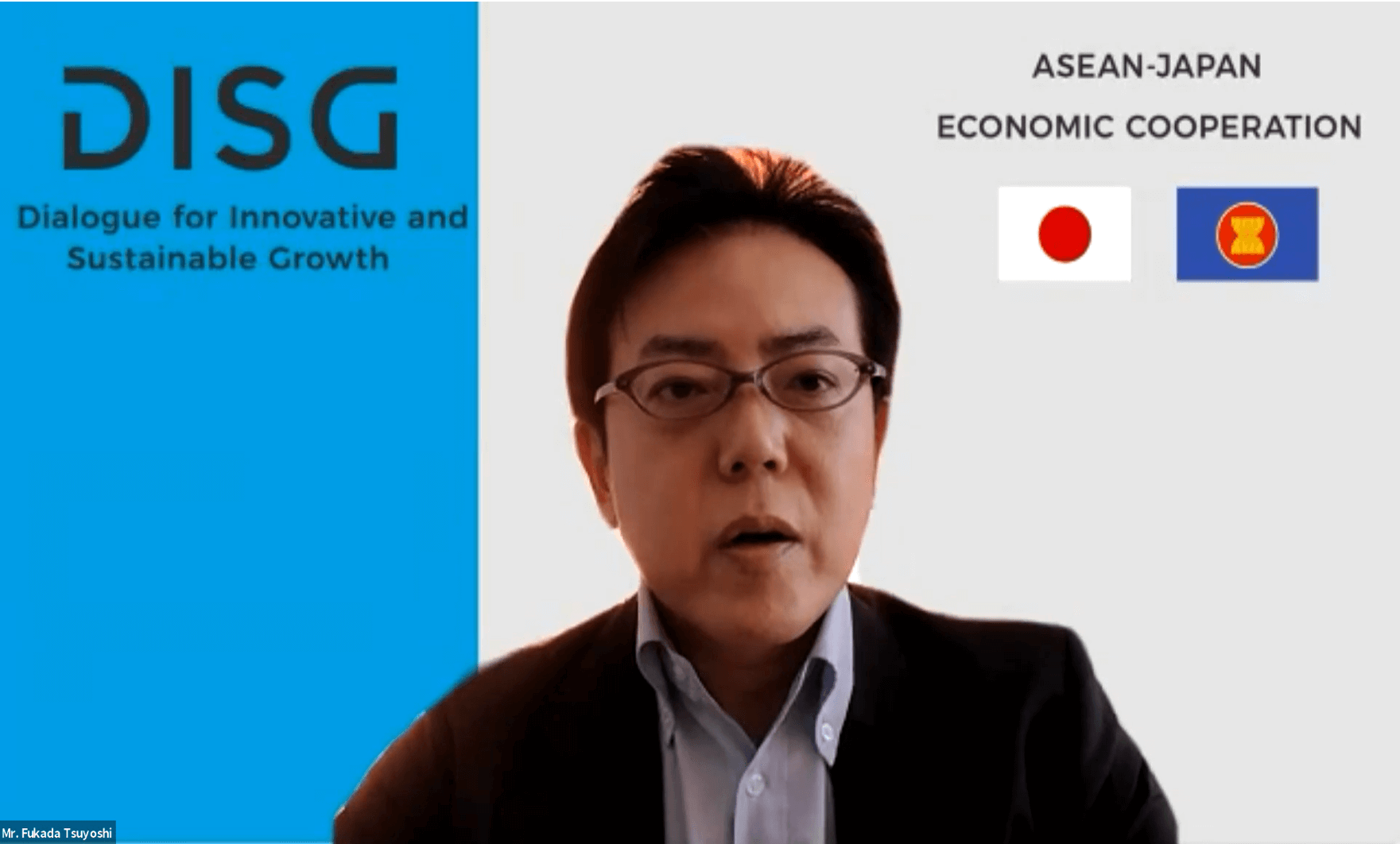
Mr. Fukada Tsuyoshi, Executive adviser, Yamato Green Co., Ltd, presented the “All Japan” integrated food value chain which was launched in Cambodia.
Overview of Yamato Green’s new project in Cambodia
-
Mr. Fukada:
Yamato Green is building the All Japan Integrated Food Value Chain in Cambodia. The “integrated” represents one consortium comprised of 18 companies in the food value chain, each with their own strong point. “All Japan” represents the quality of the products in terms of safety and security.
Yamato Green is upgrading each part of the food value chain such as IoT system applied to the production process, the application of route control applied to the transportation and so on.
One of the reasons why Yamato Green chose Cambodia is the strong support from the Cambodian government with MOUs signed between Yamato Green and the Ministries.
Future Collaboration in “All Japan Integrated FVC”
-
Mr. Fukada:
If Cambodia becomes possible to export frozen processed products, the impact on economic development will be huge. Thus, it will be necessary to set up a large frozen processing plant, and we believe that collaboration with a company with experience is necessary.
Vision of “All Japan Integrated FVC” future expansion into Mekong and ASEAN
-
Mr. Fukada:
Yamato Green planned to expand into ASEAN and Mekong region in two ways, production and sales. The company will be using the master franchise model for both segments. For production, the company will package production and management methods and financial services necessary to ensure efficient crop production to farmers. For sales, the company will be looking for partners in ASEAN to become a master franchisee to help distribute the product within their respective countries since Yamato Green can guarantee product quality and traceability.
Expectation from ASEAN to Yamato Green and Japanese companies
-
Dr. Minh:
ASEAN has various policies to ensure food security. Japanese companies could consider the implementation of these policies and support ASEAN in promoting the food value chain to ensure food security and food safety in the region.
Expectation to Japanese companies on the food value chain in Mekong region
-
Mr. Suriyan:
He agreed with Yamato Green’s vision, ASEAN regional production and market place since not every type of crop can be produced within one country and ASEAN member states need to support each other in respective processes.
The expectation for Japanese companies is to expand further into other countries using the experiences obtained in Cambodia allowing these countries to prepare policies for the food value chain connectivity.
What needs to be done now is to scale up the projects, and that can be possible by companies sharing their experiences on their projects. Companies also need to interact with the public sector in order to enable a project from a regulation standpoint. In this regard, the Japanese government can also help by providing a platform for private sectors in ASEAN and Japan to interact and share Japanese experiences.
Besides, the Japanese government is expected to showcase the Japanese company models to guide ASEAN and Mekong and its member states on how to develop their policies so that the region can replicate these success cases.
Final remarks and expectation
Expectation for ASEAN-Japan economic cooperation in the food value chain
-
Dr. Minh
Japanese companies could consider supporting ASEAN in terms of: 1) development and implementation of the agricultural standards and good agricultural practices (GAP), 2) implementation of the traceability system to meet the demand of consumers, and 3) application of technologies, especially smart farming and precision agriculture. -
Mr. Suriyan
As most countries in the Mekong region are still developing countries, there are three areas where the Japanese government can provide support further building on Japanese companies’ successes: 1) supporting to enable national policies based on the government and company’s experiences, 2) creating a platform where Japanese companies can work together with local companies and governments, and 3) supporting scaling up and adoption of the new technologies for Mekong countries. It would be great if Japanese government could establish small agriculture innovation fund where this can be used to support pilot projects to showcase proven technologies by Japanese companies for Mekong sub-region.
How Japanese technology and business can contribute to food value chain in Mekong and ASEAN?
-
Mr. Suda
As a general trading company, the company will be always open to excellent technologies and innovations not only in Japan but also in ASEAN. -
Mr. Munesato
The methods and practices for implementing Japanese solutions will have to be designed based on each country’s requirements. Therefore, it is necessary for Japanese companies to corporate with local NPOs and NGOs so that local farmers could manipulate Japanese solutions. -
Mr. Amnart
Soil analysis technology, a weather forecast platform, and food processing and packaging are three specific technologies which will be beneficial for ASEAN farmers. Access to low interest finance scheme is important for farmers to apply these new technologies. -
Mr. Fukuda
Localization of Japanese technologies and experiences is a key for its successful adoption in ASEAN. Japanese companies need to advise ASEAN practitioners to take them in a right direction.



